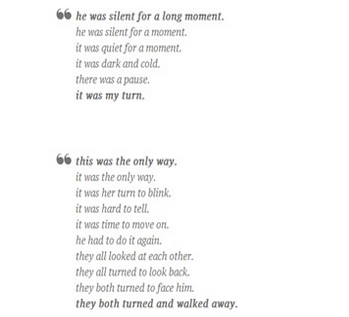(单词翻译:单击)
After its attempts to digest romance novels, one of Google's artificial intelligence projects is now accidentally writing poetry, some of which would make the fictional Vogons proud.
在读完几本言情小说后,谷歌公司开发的一项人工智能项目于偶然间写出了几段诗歌。其中一些可能会令沃贡人对自己种族的诗歌感到骄傲(沃贡人是小说《银河系漫游指南》中虚构的种族,以诗歌质量低下闻名)。
Google is working with Stanford University and University of Massachusetts in the US to enhance the natural language skills of an AI technique called recurrent neural network language model (RNNLM), which is used within machine translation and image captioning among other tasks. It essentially builds sentences a single word at a time by analysing the previous words in that sentence.
谷歌目前正在和斯坦福大学及马赛诸塞大学合作,改进一项名为循环神经网络语言模型的人工智能技术(RNNLM)。这项技术普遍应用于机器翻译和图像捕捉的任务中。而在人工智能搭建句子时,该技术会对句子中已有的单词进行分析,从而生成每个新的单词,在这一过程中起到至关重要的作用。

Currently, RNNLM is not capable of implementing global themes or features, such as a set topic, within its sentence generation. Each sentence produced by the algorithms doesn't necessarily flow smoothly into the next. The work, published as a paper through Cornell University's open scientific paper archive, arXiv, details the researcher's efforts to add the ability to apply a global theme to sentence generation using a system called a variational autoencoder and the results, including what could easily be mistaken for poetry.
目前循环神经网络语言模型的组句部分尚不具备处理包括设定题目在内的全局主题和特征的能力,而这种算法产生的句子在前后衔接得并不顺畅。这项研究以论文的形式发表在康奈尔大学公开的论文库arXiv中。论文详细描述了研究者是如何运用名为变分自动编码器的系统帮助该算法实现识别全局主题的功能的,而得出的结果极易令人将其误认成诗歌。
Some of it would arguably give Douglas Adams a run for his money, as the creator of the Vogons, the Hitchhiker's Guide to the Galaxy and its Ode to a Small Lump of Green Putty I Found in My Armpit One Midsummer Morning, during a recital of which “four of the audience members died of internal haemorrhaging and the president of the Mid-Galactic Arts Nobbling Council survived only by gnawing one of his own legs off”, according to the book.
道格拉斯·亚当斯创造的《银河系漫游指南》中一位诗人朗诵的《关于一个仲夏的清晨我在自己的腋下发现一团绿色胶泥的咏叹诗》糟糕到令“四位听了诗歌的委员会成员死于体内大出血,而银河中部艺术委员会的会长嚼完了自己的一条腿才保住了性命。”而如今人工智能写出的句子则烂到可以与这首诗一较高下了。
The researchers fed the system starting and ending sentences and then asked it to fill in the gap. Below, the bolded text is what the researchers gave the algorithm and the text in between is what it produced. The results are generated by the machine based on what it learnt from thousands of romance novels, which made some of the topics “rather dramatic”, according to the authors of the paper.
研究者准备了一段话的开头和结尾,要求系统进行填空。图中加粗的内容是研究者提供的内容,而两句话中间部分则是系统合成的内容。系统在阅读了上千本言情小说后才生成了这些句子。论文作者表示,看了这些言情小说令系统写出的一些句子“颇具戏剧性”。
The generated sentences make grammatical sense, maintain a sort of theme and for the most part fit with the start and end sentence. Others weren't quite as poetic, but still maintain the theme set by the start and ending sentences.
这些句子合乎语法规则,遵循了同一主题,大部分内容与开头和结尾的句子相吻合。有些句子并未明显体现出诗的感觉,却仍能起到承上启下的作用。
The results show interesting improvements in the ability of the machine to generate sentences that make sense together, which could led to much more human-like interactions with AI chatbots, perhaps even Google's Now.
上述结果反映了人工智能在生成有效句子方面富有趣味性的进步。这样的进步能促进人类和人工智能聊天机器人进行更多类人互动,互动的对象甚至可以扩展到谷歌的语音助手Now。


